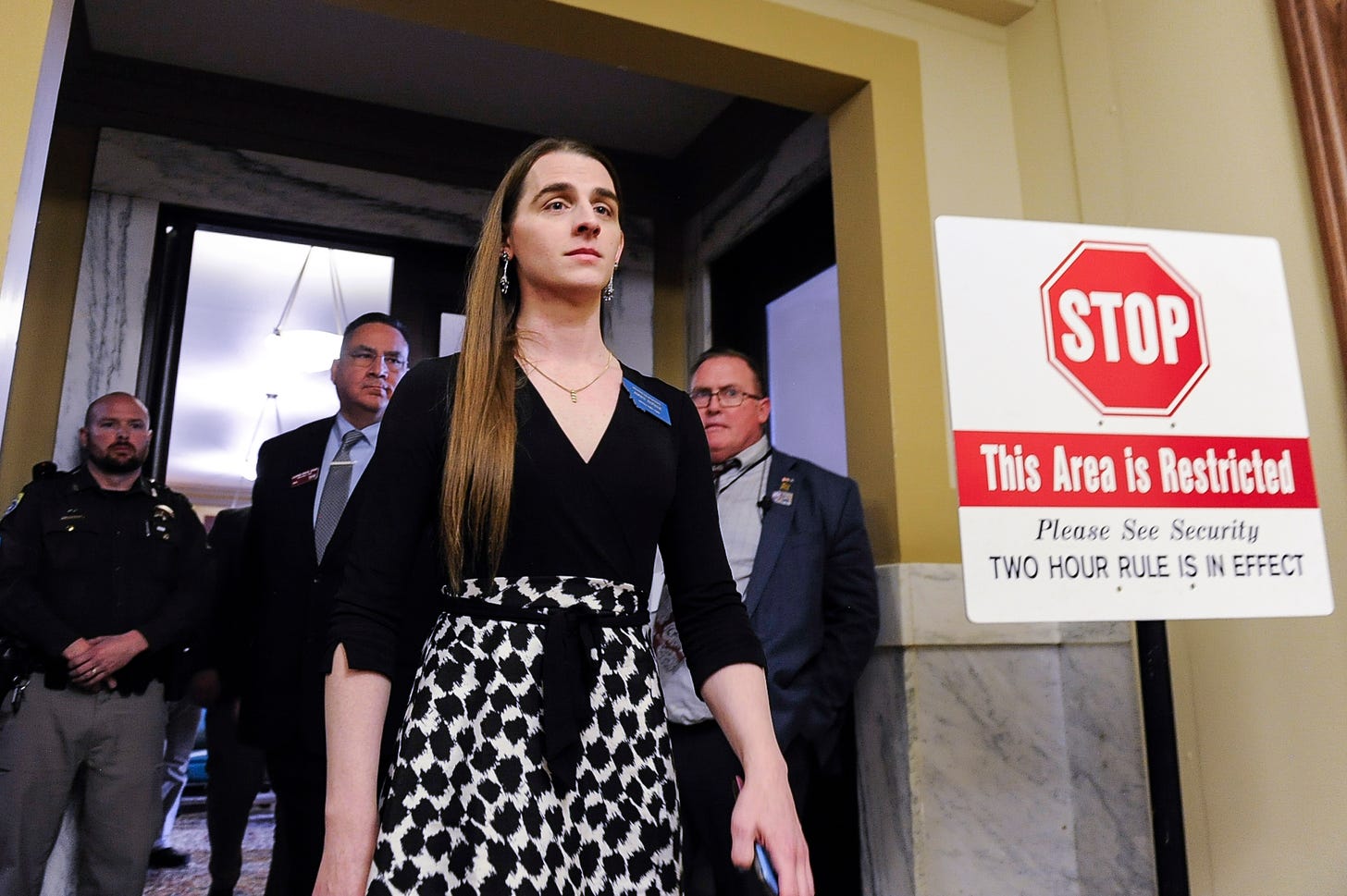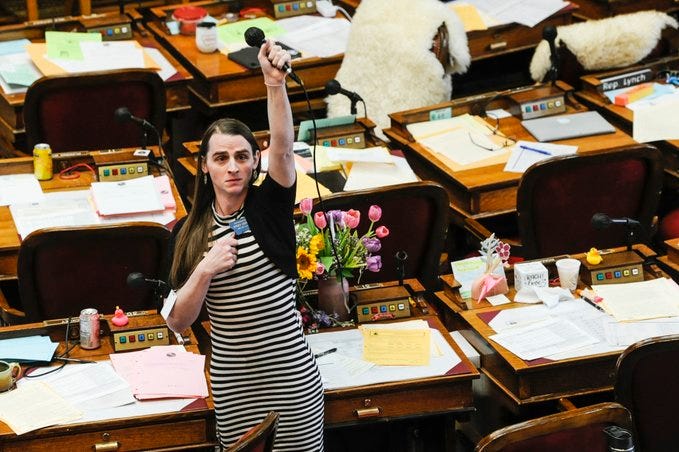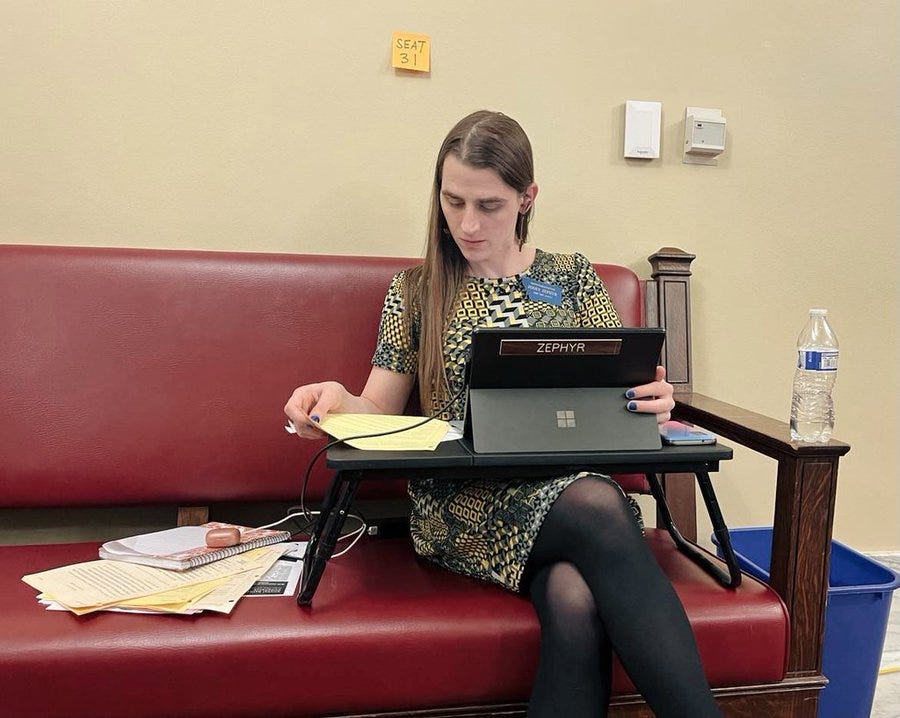
On April 28, Montana became the latest of at least 15 states to ban gender-affirming healthcare for transgender youth. Republican Governor Greg Gianforte signed SB99, called the “Youth Health Protection Act” into law despite pleas from his own adult nonbinary son, David (he/they), hours of testimony from healthcare providers and parents, opposition from state and national advocacy organizations, and in direct conflict with best practices established by the consensus of reputable national medical and psychological organizations.
The bill prohibits the use of puberty blockers, hormonal therapies, and certain surgeries to treat minors diagnosed with gender dysphoria. Physicians and other healthcare professionals who knowingly provide these medications or procedures to transgender youth will be subject to a mandatory one-year suspension of their medical license and can be sued by former patients for a period of up to 25 years. Any damages assessed as a result of those lawsuits cannot be covered under their professional liability insurance policies. Hormonal medications, circumcisions, and breast reduction or enhancement surgery for cisgender minors are still allowed, as well as “gender-normalizing” surgeries on intersex children.
Ten days prior, Democratic House Representative Zooey Zephyr (HD100-Missoula) told House Republicans during debate:
“If you are denying gender-affirming care and forcing a trans child to go through puberty, that is tantamount to torture, and this body should be ashamed…If you vote yes on this bill and yes on these amendments, I hope the next time there's an invocation, when you bow your heads in prayer, you see the blood on your hands.”
Several other politicians from across the nation have used almost identical rhetoric without consequence in recent years to criticize their colleagues on a variety of topics ranging from cash bail reform to gun laws.
In Montana, the remark provoked outrage from House Republicans who called it “belittling” and “an affront to civil discourse.” The Montana Freedom Caucus, a group of conservative Montana lawmakers, posted a letter on Twitter demanding that Rep. Zephyr be formally censured “for trying to shame the Montana legislative body by using inappropriate and uncalled-for language during a floor debate.” The letter deliberately misgendered Rep. Zephyr and directly implied that her kind of “hateful rhetoric” was to blame for the March 27 mass shooting at Covenant School in Nashville, TN. (The Covenant School shooter is alleged to have been a transgender person.) House Minority Leader Kim Abbott (HD83-Helena) said in a statement, “I find it incredibly ironic that these legislators are making demands of others that they refuse to abide by themselves.”
When Rep. Zephyr refused to apologize for or retract her comments, Republican House Speaker Matt Regier (HD4-Kalispell) spent the rest of the week denying her requests to speak on bills that would insert binary definitions of “male” and “female” into the state’s Code, prevent minors from seeing online pornography, and restrict K-12 students’ ability to change the names and pronouns they use at school. Speaker Regier claimed his decision to block Rep. Zephyr from speaking was necessary to “maintain decorum.”
On the morning of April 24, hundreds of Rep. Zephyr’s supporters rallied on the Capitol steps in protest against the proposed bills and to demand that she be allowed to participate in floor debate. They displayed two banners made of stitched-together bed sheets that spanned the width of the Capitol steps, painted with the message “Democracy Dies Here” in red letters. Member of the crowd waved Pride flags and carried signs reading “Trans Lives Matter More than Republican Feelings” and “Equal Rights for All Montanans.” The Montana Federation of Public Employees delivered a petition entitled “Speaker Regier: Don’t Silence 10,000 Montanans” with more than 3,200 signatures demanding that Rep. Zephyr be allowed to speak on behalf of her constituents. Rep. Zephyr addressed the crowd from the Capitol steps:
“I was sent here to speak on behalf of my constituents and to speak on behalf of my community. It’s the promise I made when I got elected, and it’s a promise that I will continue to keep every single day. When those communities who see the repercussions of those bills have the audacity to stand up and say, ‘This legislation gets us killed,’ those in power aren’t content with just passing those hateful, harmful bills. What they are demanding is silence. We will not be complicit in our eradication.”
Hours later, when Speaker Regier again refused to recognize Rep. Zephyr, protestors interrupted proceedings for nearly half an hour with shouts of “Let her speak!” and “Who’s House? Our House!” Some also threw gloves covered with fake blood onto the House floor. Police in riot gear cleared the gallery and arrested seven people on charges of criminal trespass, all of whom were later released without bail. There were no reports of any injuries, threats to lawmakers, or property damage. During the commotion, Rep. Zephyr stood silently at her seat with her microphone raised above her head, even as House leaders cut the sound on the livestream feed.

House Speaker Regier, Speaker pro tempore Rhonda Knudsen (HD34-Culbertson) and Majority Leader Sue Vinton (HD56-Billings) issued a statement calling the floor protest “a riot by far-left agitators” who “endangered legislators and staff.” The Montana Freedom Caucus issued another open letter calling the protestors “violent,” accusing Rep. Zephyr of “encouraging an insurrection,” and demanding immediate disciplinary action against her. In a statement on behalf of House Democrats, Minority Leader Abbott described the protests as “an incredible statement in support of the trans, nonbinary, and Two Spirit community - and against the Republican agenda that would strip our neighbors of their basic rights, dignity, and humanity.”
On April 25, House Speaker Regier cancelled the floor session without explanation. Rep. Zephyr received written notice that the House would hear motions the next day on whether her conduct had violated House decorum rules, and if so, how she would be punished. The notification letter said the House galleries would be closed to the public to “to maintain decorum and ensure safety,” but Rep. Zephyr would be allowed to speak.
She did not use her time to apologize. Instead, she defended her comments as an accurate description of the stakes of gender-affirming healthcare bans for transgender youth. She said that by asking her to apologize on behalf of decorum, the House Speaker was really asking her “to be complicit in this legislature’s eradication of our community,” something she said she would always refuse to do. She addressed Speaker Regier directly, telling him that by silencing her, he was taking away the voices of her 11,000 constituents and attempting to drive “a nail in the coffin of democracy.” She then told her colleagues:
“If you use decorum to silence people who hold you accountable, then all you’re doing is using decorum as a tool of oppression.”
In a 68-32 vote along Party lines, the Montana House of Representatives officially censured Rep. Zephyr for violating decorum rules by “actively participat[ing] in disrupting the lawful activities” of the state legislature. She was barred from the House floor, anteroom, and gallery for the remainder of the session, a punishment that had not been previously issued for nearly half a century. Her key card to access Capitol entrances and bathrooms was also deactivated.
Up to this point, one could possibly argue with a straight face that Rep. Zephyr was being punished for a lack of civility, if rather hypocritically so. That claim becomes rather less believable as the behavior on display from Montana Republicans devolves into pure, brass-plated retaliatory pettiness.

On the first day of her exile, Rep. Zephyr attempted to work and vote remotely from her laptop on a public bench in the hallway outside the House chambers. Speaker Regier told her she could not sit there, allegedly out of concern about the hallway being blocked. When she insisted on staying, one of the House security officers threatened to remove the bench. A conversation between Speaker Regier and House Minority Leader Abbott temporarily resolved the matter and the makeshift “Seat 31” was allowed to remain.
Meanwhile, Republican leadership announced that the two committees on which Rep. Zephyr serves, the House Judiciary and Human Services Committees, would have their work reassigned and would not meet again for the remainder of the legislative session. Some bills went directly to the full House for debate, while others, like the abortion pill study bill heard by Business and Labor, were sent at random to whichever other active committees that still had space on their calendars. Coincidentally, House Judiciary Committee Chair Rep. Amy Regier (HD6-Kalispell) is Speaker Matt Regier’s sister. The next morning, House Judiciary Committee Clerk Jamie Van Valkenburg quit her job to join Rep. Zephyr’s staff. She told reporters, “My new role entails a lot of making sure this bench doesn’t move.”
But come Monday morning, Rep. Zephyr herself had to move to the end corner of the nearby snack bar. As she explained in a tweet:
“Some folks showed up early this morning and sat on the public benches near the entrance to the House, so Seat 31 has moved. I'm up and ready to work. Plus, I hear stand desks are all the rage these days.”
Among the bench-sitters were Sharon Nason, Beth Hinebauch, and Jolene Regier. Sharon is the current Chair of Pro-Life Helena. Beth is the wife of Montana Freedom Caucus member Sen. Steve Hinebauch. Jolene is the wife of Senator Keith Regier (SD3-Kalispell) and mother of Rep. Amy Regier and House Speaker Matt Regier.

Seat 31 was back to its original spot on Tuesday, after a “Blue Bench Brigade” of Rep. Zephyr’s supporters arrived even earlier than the Menopausal Mean Girls to save her a spot. That was the day’s only good news. District Court Judge Mike Menahan dismissed the ACLU’s lawsuit challenging Rep. Zephyr’s censure that morning, saying it was outside his authority to overrule the Legislature. With the current session coming to an end the next day, the ruling meant that Rep. Zephyr will likely not speak on the House floor again unless she is re-elected in 2024. By nightfall, both Rep. Zephyr and her partner, journalist Erin Reed, had been targeted with anonymous falsified criminal activity complaints, a harassment tactic known as “swatting,” at their separate residences in Montana and Maryland.
Who’s Afraid of Zooey Zephyr?
When some folks look at Zooey Zephyr, they don’t see a 34-year-old Billings native with dual Bachelor of Arts degrees in Business Administration and Creative Writing. They don’t see the progressive Democratic voice of 11,000 Montanans who won her seat by a landslide over her Republican challenger with 79.3% of the vote. Her detractors definitely don’t see a proud, confident, bisexual transgender woman in a committed same-sex relationship. Some don’t even want to see fully see her as a human being. To them, she’s a predator, a “groomer,” an attention-seeking, mentally ill imposter with a made-up name. (Somebody should maybe tell them that all names are made up.)
Zooey Zephyr’s opponents in the Montana House are doing everything they can to silence and diminish her, not just to be cruel, though that certainly seems to be a significant factor. When they look at her, what they see more than anything is understated audacity personified. She is the very embodiment of a threat —not to the safety of their children, the women’s restroom, or the decorum of the Legislative chamber, but to their stranglehold on both State legislative power and the public narrative.
“What you’re seeing at the national level is communities who are impacted by legislation rising up and saying these bills harm us, these bills get us killed. It’s not enough for them to get their bills through. They want us to be silent.”
- Rep. Zooey Zephyr
As much as the transphobes and patriarchs among them try to argue that Zooey is not a “real” woman, they sure do treat her like one. They’re constantly telling her to sit down, shut up, keep her nose out of the Good Old Boys Club’s business and her offensively manicured hands far away from the levers of state power.
Some in her same position might have looked at the level of nonstop intimidation she faced, the number of obstacles in her way, and the strength of the Republican supermajority and thought “What’s the point in putting myself through all this?” The point is that even when yours is only one vote and one voice, so is everyone else’s. There’s still power in “getting into the room where the laws are being written,” and in saying inconvenient truths in forums where those words and that message cannot be ignored.
Zooey knows this all too well, and she refuses to let either her constituents or her enemies forget it. Even the strongest of winds can still be deflected, shuttered, or blocked. No matter what anyone tries, even the gentlest of winds can never fully be stopped.
It’s a lot like joy that way, and may Zooey and Erin’s remain undiminished.



